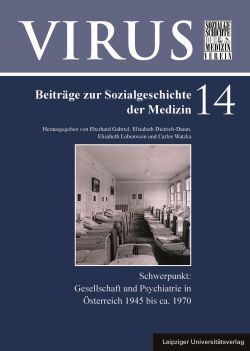
VIRUS Band 14, pp. 103-138, 2020/07/23
Schwerpunkt: Gesellschaft und Psychiatrie in Österreich 1945 bis ca. 1970

The article deals with the professional biographies of the leading experts in psychiatry (and neurology) working at the University of Graz and the asylum at Feldhof/Graz in the period between the end of national socialist regime and the year 1970, as the approximate end of the post-war-period. A focus is laid upon the outstanding biography of Hans Bertha. A Styrian physician, NSDAP-member, SS-officer since 1937, NS-health politician, “T4-reviewer” 1940/41, and director of Austrias largest mental asylum in Vienna in the years 1944/45 – and in these functions responsible for the deaths of a large number of mental patients –, Bertha somehow managed to evade any serious consequence for his crimes after the end of the Nazi government; only being arrested for inquiry from April to December 1945 and again 1946/47. Strikingly, Bertha was re-awarded his lectureship at the University of Graz in 1953 and even appointed head of the psychiatric-neurological clinic in Graz later (1954 provisional, 1960 regular). Ascending even further and becoming dean of the medical faculty in 1963, Bertha died shortly after from injuries caused by a car accident that had occurred in Yugoslavia under not fully clarified circumstances.Apart from this exceptional negative example, the pre- and post-1945 careers of the other – provisional or definitive – heads of the psychiatric-neurological clinic in Graz within the stated period are dealt with, yet in shorter manner: Heinrich di Gaspero (1945/46), Wolfgang Holzer (1946–54), Erich Pakesch (1964–68), Herbert Reisner (1968–71), as well as those of the directors of the main statal mental asylum in Styria, Feldhof: Peter Korp (1945–54), Ernst Arlt (1954–59), Anton Oswald (1960) and Fritz Mayr (1961–69). Among these physicians, who may be regarded as the professional elite in psychiatry in the post-war province of Styria, there were several former National Socialists, too. Ideological opponents of the Nazi regime and particularly of its policy of mass murder of mental patients obviously were a minority among Styrian psychiatrists of these days. Still, three of the named post-war heads, Holzer, Pakesch and Arlt, have to be regarded as such. In addition Gerald Grinschgl has to be named, still a student of medicine before 1945, but lecturer for psychiatry and neurology from 1959 onwards.
Keywords: Psychiatry, neurology, Austria, Styria, Graz, post-war-period, collective biography, post-war professional careers, national socialist crimes against mentally ill people, Hans Bertha